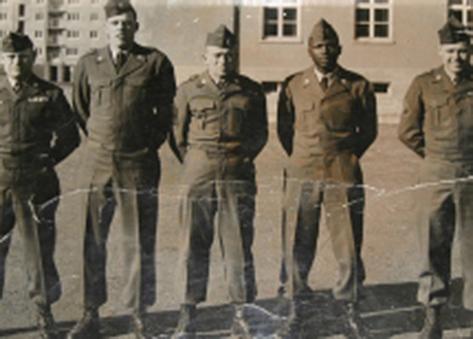
Vet remembers integration in post-war Germany
Jul 25, 2008
BY Felicia Thompson
Sgt. 1st Class Monroe Sweet (2nd from right) poses with his fellow NCOs in Germany in 1960. Photo by courtesy
WASHINGTON (Army News Service, July 25, 2008) - Retired Army Sgt. 1st Class Monroe Sweet was in an all-black unit July 26, 1948 when President Harry S. Truman signed Executive Order 9981 to provide equal treatment and more opportunities for black servicemen in the Armed Forces.
Sweet became the first black non-commissioned officer to lead an all-white platoon in his artillery command in Germany. However, he said the road to integration was not always an easy one.
"I was drafted in the Army June 29, 1942 and served in segregated units until 1960," Sweet said. "We had black units with white NCOs."
According to Sweet, segregation in the Army did not bother him much.
"I followed orders, continued to earn rank and eventually I led an all-white platoon, which was a milestone at the time," he said. "This country was segregated and I didn't know any different. I'm from Louisiana. We lived segregation."
After occupation service in Germany, Sweet went home on 90 days leave and did not like the culture he had returned to.
"I had to turn 30 of those days back in because I couldn't take living in Louisiana again," Sweet said. "I didn't feel happy having to climb over white people to get to the back of the bus with my uniform on. I didn't seem a part of the country I was fighting for. My mind was going back to Europe where I was treated better. In Germany, I didn't have to go through back doors. They considered you a part of them especially if you learned their language. We ate and talked together," he said.
Sweet served in the Korean War and in the Philippines before returning to Germany in 1960. He fondly recollects the day he was chosen to lead an all-white platoon.
"My commander had called me down to interview for the platoon sergeant position that was becoming available in two months," Sweet said. "I was the only black there. I was sergeant first class at the time and was to replace a sergeant. The captain said he would let me know if I get the platoon. I told him, 'I don't lay around in nobody's company waiting for a job and if you permit me I will go out and find me a home,' he said.
Sweet told the captain the only reason why he went to the interview was because the Department of the Army commanded him to do so. The captain apparently liked what he saw in Sweet and offered him the platoon the following day. Sweet began being proactive, knowing he was to be the first black NCO in the unit in charge of an all-white platoon.
"I began brushing up on everything, like my manners and artillery knowledge, because I wasn't going into a white unit and have them know more than me," he said. "A lot of the time, the other leaders would ask me to take over and teach their classes. I earned their respect by leading the way and knowing my stuff."
Although segregation was still the norm throughout most the Army at the time, Sweet said he was afforded the opportunity to learn different languages and experience different cultures and meet different people. The Army also sent him to school so he could keep his ground-breaking position.
"I had a 6th-grade education because my mother was a widow; I had to quit school and go to work to help out." Sweet said. "Then I was drafted, moved up in rank and soon found myself back in school."
At the time, the Department of the Army wanted to ensure the force was adequately educated, thereby issuing a directive stating all black Soldiers' general technical scores had to be 100 or they needed a general equivalency diploma score of 90 percent or better to remain in the regular Army.
"My white captain came to me and said, 'I don't want to lose you because you're too damn good a platoon sergeant, but your GT scores are a little low," Sweet said. "Go to school, do what you have to do and we'll take care of the platoon.' I went to school and will never forget my teacher, Ms. Gazzetti. I asked a lot of questions because I didn't know fractions."
Luckily, Ms. Gazzetti was a patient and nurturing instructor, Sweet said.

"She would explain things and we would take a test every week," he said. "On the final test, some of the guys with 8th- and 9th-grade educations were finished quickly. I was last to leave the class. Ms. Gazzetti asked to see my exam to see if I had passed. I passed and right afterward I took my GED and received a score of 98. It was an integrated school for Soldiers."
Sweet, now a resident of the Armed Forces Retirement Home in Washington, D.C., is still passionate about his service to the nation.
"I love this country!" he said. "But what was good for one troop was good for all troops. Truman's executive order was a good thing for the Army."
- Log in to post comments
